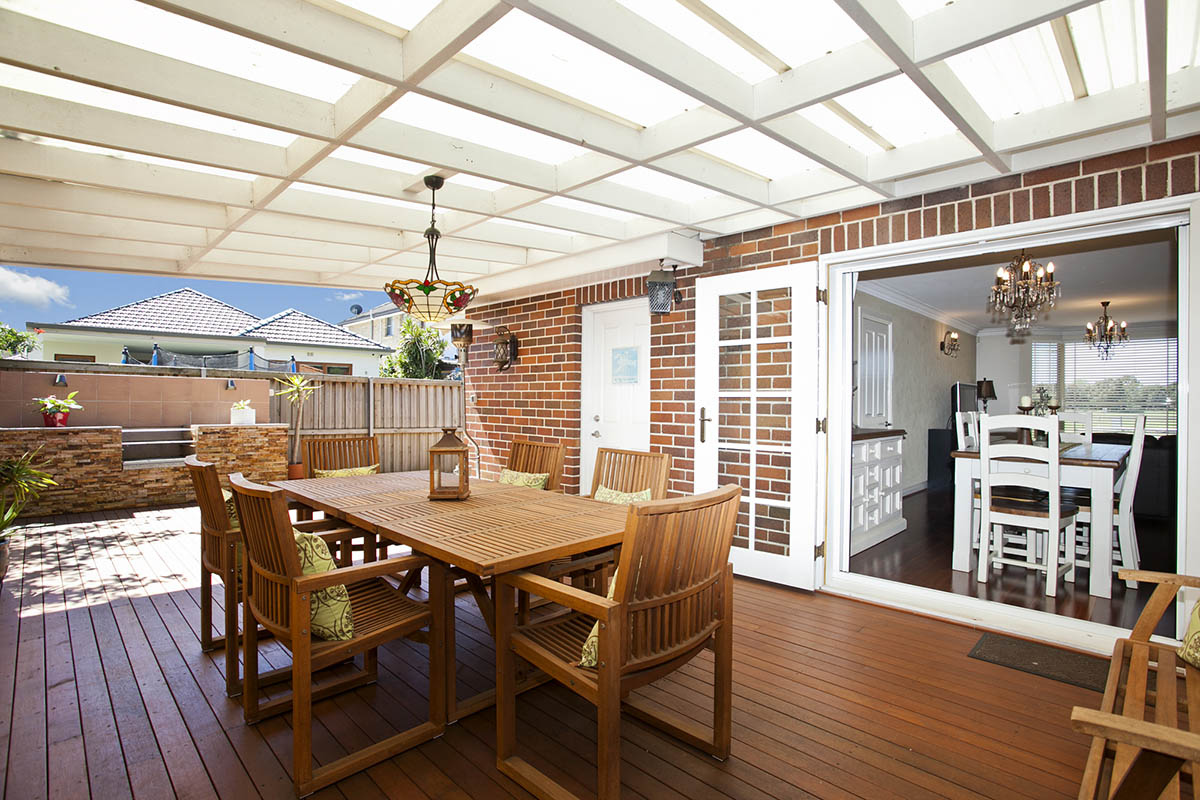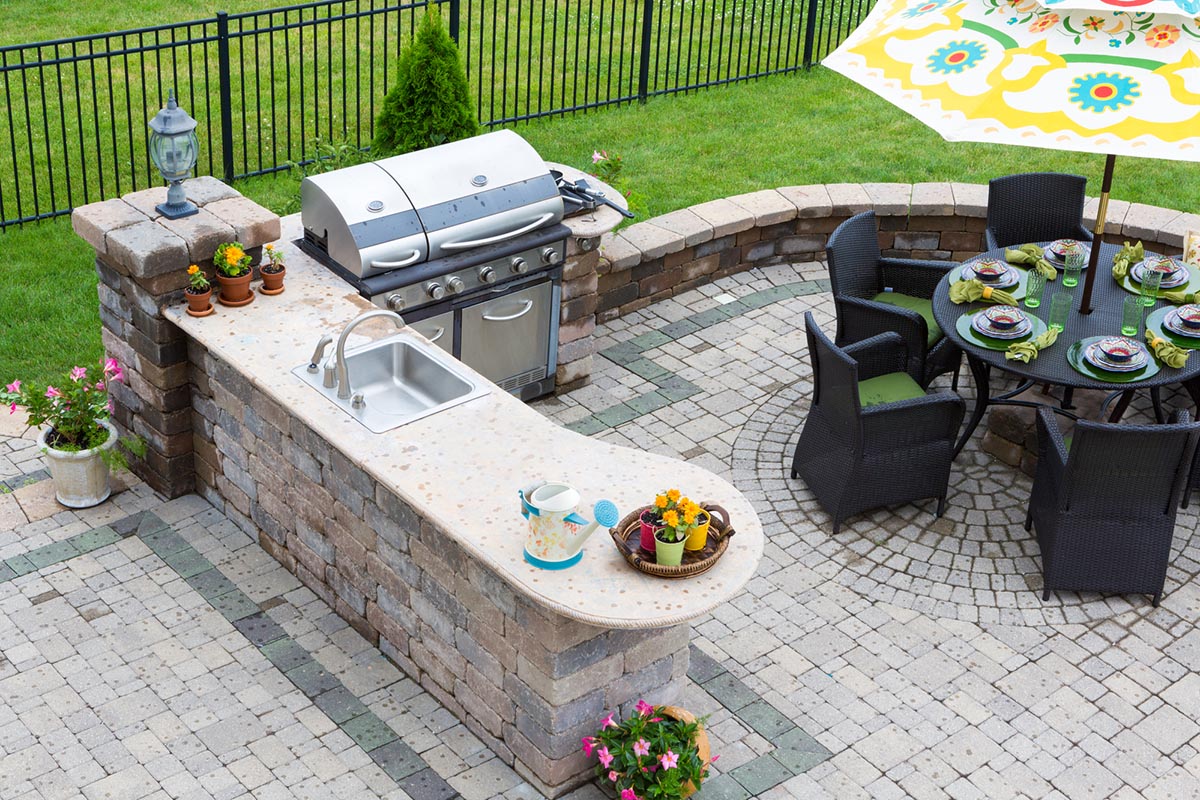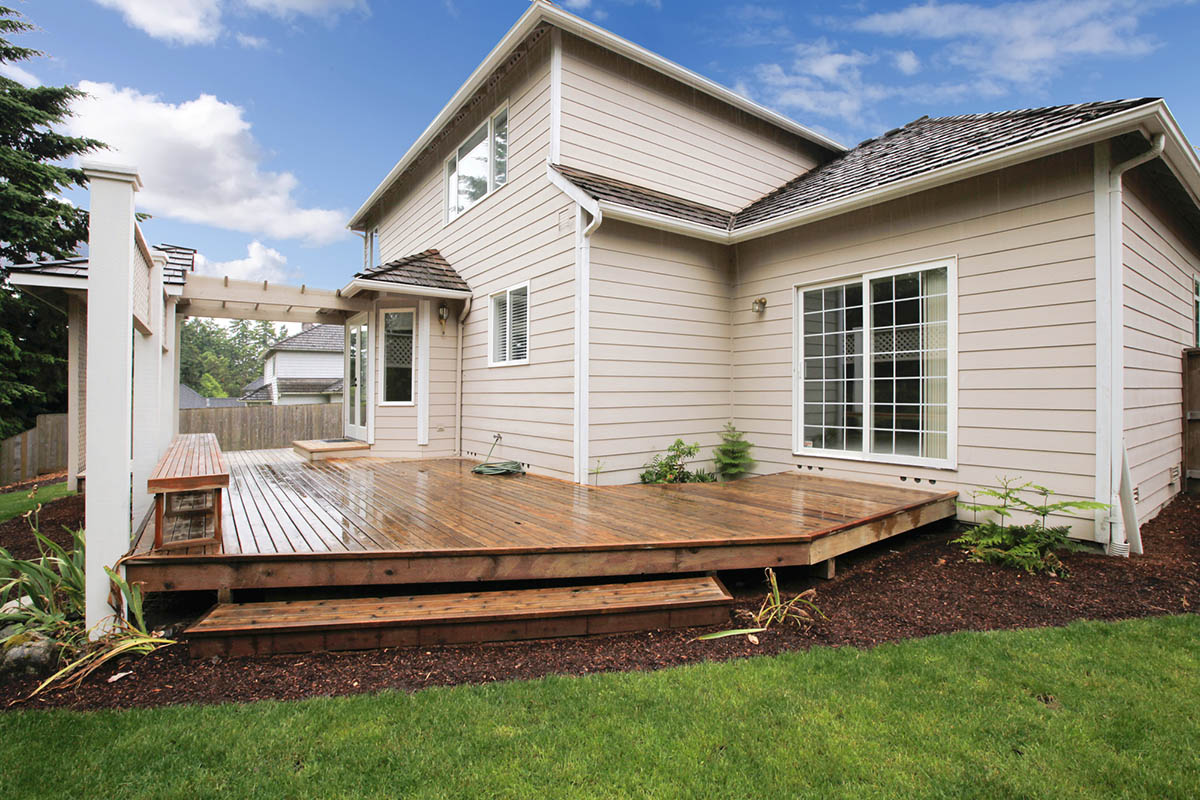

We may earn revenue from the products available on this page and participate in affiliate programs. Learn More ›
Both decks and patios are great choices for outdoor living. These open-air spaces provide the perfect backdrop for entertaining and relaxing with friends and family while enjoying the outdoors.
You might wonder how these two outdoor living areas differ. While decks and patios are typically used for similar purposes, the fundamental difference is that decks are raised, while patios are flush with the ground. There are also some differences in materials, construction, and cost of building. Read on to learn about the key differences between a deck vs patio and see which one is right for your home.
Decks can provide a great view, while patios tend to offer more privacy.

The views from your deck or patio depend on your home’s location and surrounding environment. However, decks usually offer better views than patios due to their elevation. From a deck, you’ll be able to look out onto your backyard and see further into the horizon—an especially appealing choice if you live near water. Whereas with a patio, depending on what surrounds your property, you might be stuck staring at the back of your neighbor’s house. However, patios built close to the home and low to the ground can offer more privacy than a deck, especially if they are enclosed with walls or a roof.
Some decks require a building permit and inspections, while patios typically do not.
Permits and inspections are often required when building a deck because they are attached to the home and impact its exterior structure and appearance. It’s important to obtain the proper permits before starting the construction of your deck. You may also need to get inspections throughout the process to ensure your deck is built to code and meets all the requirements of your municipality. This will help create a safe outdoor space. If you fail to follow these guidelines, you could end up paying a fine or being required to remove your deck completely.
Patios are simpler to build and usually do not require permits or inspections because they sit directly on the ground and don’t affect the structure of the home. However, it’s always a good idea to check with your city before you start building your patio to ensure you don’t need any permits.

Patios generally cost less to build than decks do.
When creating a budget for a new patio or deck, make sure to consider the material, size, and location of this outdoor living space, as these items can all impact the cost.
Building a patio is often the more cost-effective option due to a variety of factors. Patios consist of more affordable materials like stamped concrete or stone as opposed to wood or bricks which are common for decks. Patios also require less labor and maintenance, which can help keep the costs down.
Since patios generally don’t require permits or inspections, they can save you money as well. For the most affordable solution, build your own patio as a weekend DIY project.

Decks can be built on uneven terrain where patios are unsuitable.
Although building a deck is more labor-intensive and often involves hiring a professional, decks are better suited for uneven land. Since patios are built directly on the ground, they require flat land underneath. This can sometimes require extra prep work, especially if you live in a hilly area.
Before deciding on building a deck or patio, it’s a good idea to assess the space where you want to build and measure the grade of the land to determine if it’s flat or not. This may help with your decision process.
Decks have weight restrictions.
Weight is an important consideration factor for raised decks. A well-constructed deck should have a solid foundation to support the weight of furniture and guests. But there will still be some restrictions due to its elevated height. This is another reason why it’s so important to get the right permits and inspections throughout the build process.
Determine what you want to put on your deck and make sure everything fits within the weight requirements. Heavier items like hot tubs might be better suited for patios since they are flat to the ground and do not have the same weight restrictions as decks.

Patios are easier to maintain than natural wood decks.
Natural wood decks are beautiful but require a lot of maintenance. They often need to be restained or repainted, sealed, and power-washed every couple of years to maintain the integrity of the wood. For a similar look that is more durable, you could opt for a wood composite material.
If you are looking for an outdoor living space that is even easier to maintain and can withstand more wear and tear, patios are a great alternative to decks. The upkeep for patios is less expensive and time-consuming because the materials they are usually made of, like concrete and stone, don’t require as much maintenance as wood. Whether you choose a deck or a patio, the material you choose will impact the time and money you’ll have to spend on maintenance.
Patios have a longer lifespan than natural wood decks but are prone to cracks and stains.
Patios are longer lasting than natural wood decks which is beneficial if you are looking for a long-term solution that is easier to maintain. However, they can still be susceptible to cracks and stains which require minor upkeep.
You won’t get quite as many years out of natural wood decks because they are less durable than patios but they can last for a long time with proper care. Routine maintenance can extend the longevity of both decks and patios.
Deck materials naturally absorb and retain less heat.
It’s no fun to walk onto a deck on a hot summer day and scorch your feet. That’s why you should choose a material that naturally absorbs and retains less heat like aluminum, Ipe, or concrete. These deck flooring options will help keep the ground cooler and more comfortable for bare feet.
If you want to stick with the wood look, real wood decks typically stay cooler than synthetic wood decks. However, it depends on the brand. Be aware that dark-colored composite deck floors can get extremely hot. No matter which material you choose for your new deck, lighter colors will absorb less heat.

Decks have higher resale value than patios.
Decks require a larger initial investment but have higher resale value than patios. These raised structures can increase the value of your home and are a great selling point for potential buyers—especially in warmer climates where outdoor living is the norm.
If you’re looking to sell your house in the next few years and want to maximize your return on investment (ROI) with an outdoor structure, building a deck may be a smart way to go. Just make sure you get to enjoy your new deck before putting your house on the market.
While less expensive to build, patios have lower resale value. Before choosing a deck vs. patio, consider when you plan to sell your home. This will help you balance the estimated cost with the potential ROI.
